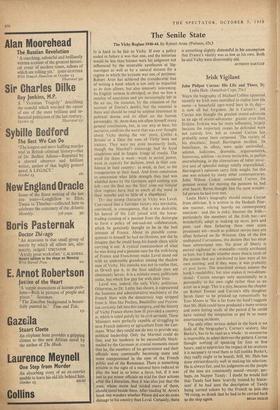The * Senile State
The Vichy Regime 1940-44. By Robert Aron. (Putnam, 42s.)
Jr is hard to be fair to Vichy. If ever a policy ended in failure it was that one, and the historian would be less than' hdman were his judgment not influenced by the miserable apotheosis at Sig- maringen as well as by a natural distaste for a regime in which the keynote was one ,of pettiness. Robert Aron has achieved the considerable feat of writing a book which is not only as impartial as its date allows, but also intensely interesting. Its English version is abridged, so that we lose a number of anecdotes and are occasionally left in the air (as, for instance, by the omission of the account of Doriot's death), but the essential is there and should be read by anyone' interested in political drama and its effect on the human personality.. M. Aron does not allow himself many general conclusions, but, in one way at least, his narrative confirms the worst that was ever thought about Vichy during the war years. Unlike a. Brinod or a Deat the men of Vichy were not traitors. They were not even necessarily fools, though the Marshal'S entourage had its loyal simpletons 'and its lunatic fringe of crankS. The word for them is weak—weak in actual power, weak in capacity for decision, weak in their con- fidence in their country : as weak, in fact, as the octogenarian at their head. And from concession to concession what little strength they had was whittled down by the Germans, until nothing was left—not the fleet nor the 'free' zone nor,honour (few regimes have had so much of till word in their mouths and so little of it elsewhere).
erfr^ one strong character in Vichy was Laval. Convinced that a German victory was inevitable, convinced, in consequence, that it was desirable, his hatred of the Leff joined with the horse- trading cunning of a peasant from the Auvergne to form a policy of out-and-out collaboration, which he genuinely thought to be in the best interests of France. About its possible conse- quences to himself he had no illusions, nor did he imagine that he could keep his hands clean while carrying it out. A cynical consciousness of what he was doing and a genuine care for the well-being of France and Frenchmen make Laval stand out with an undeniable grandeur among the shadow men of Vichy. His mistake was not to realise that, as Orwell .put it, in the final analysis men are obstinately heroic. It is a mistake many politicians make, but,which few pay for with their lives.
Laval was, indeed, the only Vichy politician. Otherwise, as Dr. Ltithy has shown, it represented the business and administrative machinery of the French State with the democratic toga stripped from it. Men like Pucheu, Bouthillier and Peyrou- ton certainly fall into this category, and the history of Vichy France shows how ill provided a country is, which is ruled purely by its civil servants. These Ministers were perfectly capable of struggling to save French industry or agriculture from the Ger- mans. What they could not do was to provide any political leadership. Only the Marshal could do that, and his tendency to be successfully black- mailed by the Germans at crucial moments meant that he, the members of his government and their officials were continually becoming more and more compromised in the eyes of the French public and of the Resistance. There is something pitiable in the sight of a national hero reduced to play the lead in so bitter a farce, but, if it was just to put minor officials on trial for their actions after the Liberation, then it was also just that the man, whose name had misled many of them, should stand beside them. After reading M. Aron's book one wonders whether Main did not do more damage to his country than Laval. Certainly, there
is something slightly distasteful in his assumption that France's vitality was as low as his own. Both he and Vichy were abominably old.
ANTHONY IIARTLEY


















































 Previous page
Previous page